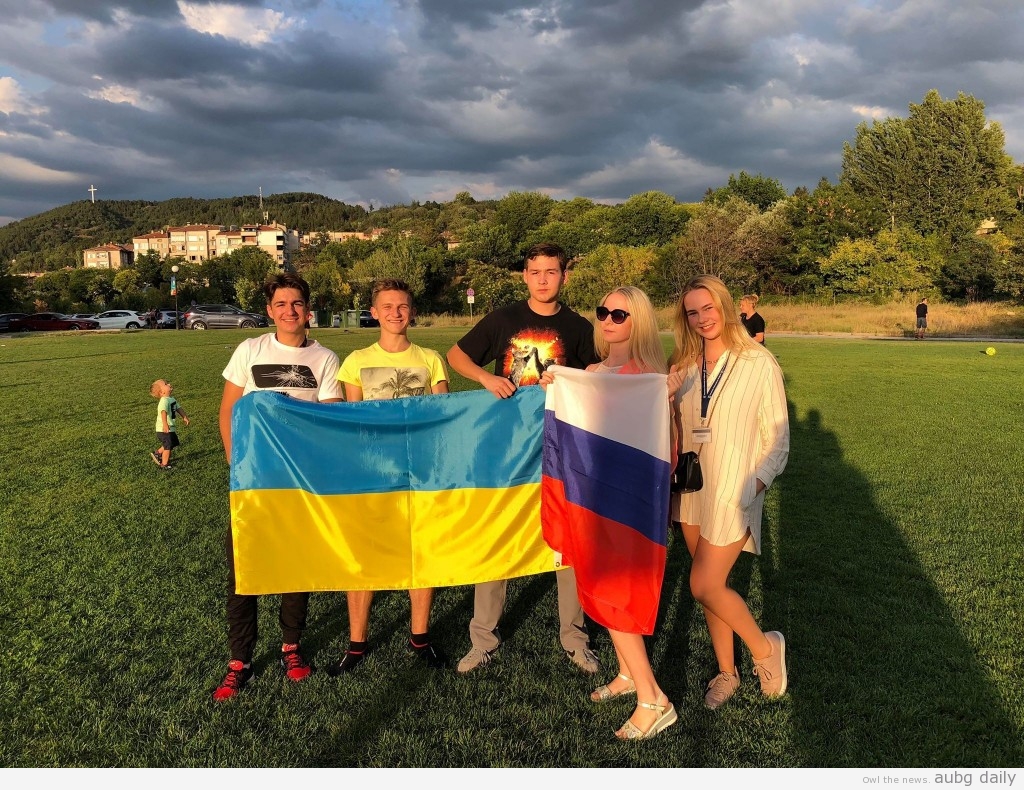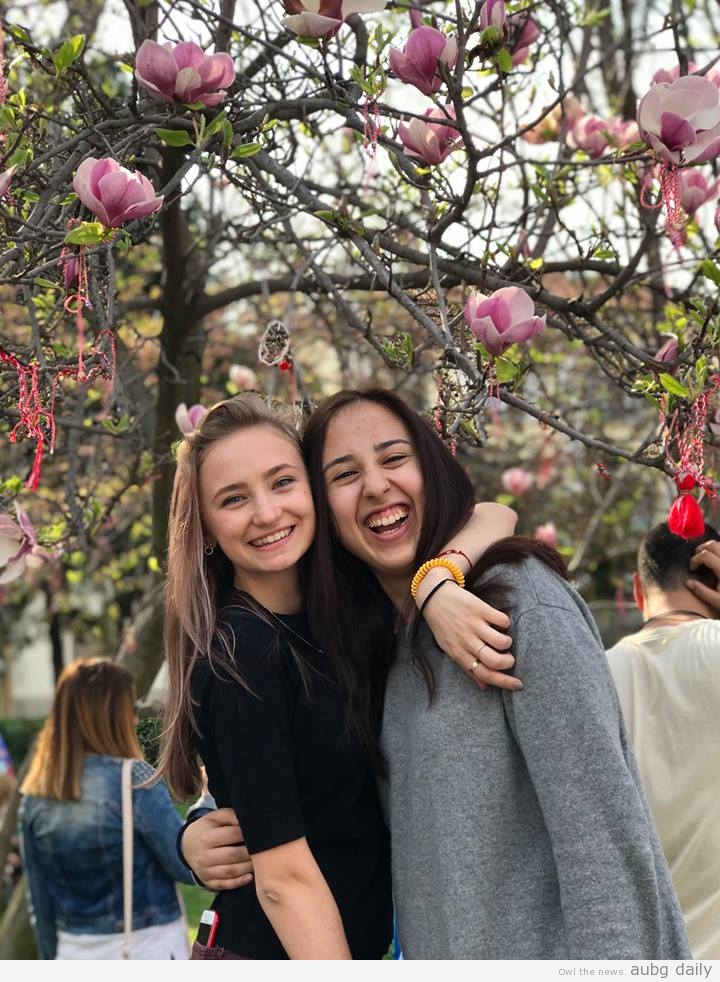- In Campus news
- 09/12/2018 13:58
- 1471 Views
- 0 Comments

As TASS reported, “three Ukrainian vessels were detained by Russian forces” in the Kerch strait on Nov. 25 since, according to Russia’s Federal Security Service they “illegally entered Russia’s territorial water.” Even though the conflict between Russia and Ukraine has been continuing since 2014 starting with Russian troops taking control of Ukraine’s Crimean region, the Kerch strait case caused Ukraine to approve for the first time the martial law in regions bordering Russia.
AUBG students from both Russia and Ukraine shared their concerns and answered the question if the tense atmosphere between the countries is affecting their families and relationships with other students.
Anastasiia Ivankova, a first-year student from Odessa, Ukraine, majoring in Business Administration and Psychology said, “It is the first day of the official martial law, so I can’t say for sure [if it is going to affect my family].” She was surprised when asked about the effect on her friendship with Russian students at AUBG. “They didn’t change. I’m still the same, and judging the whole nation by the actions of the authorities is the worst thing you can do in this situation.” Anastasiia called the conflict “the media war.” She added, “The truth is that neither Russians nor Ukrainians are told the truth.”
Both Arseniy Mishurov, a first-year student from Moscow, Russia, majoring in Economics and Business Administration, and Vasilii Kulev, a fourth-year student from Kaluga, Russia, majoring in Journalism and Business, confirmed having Ukrainian friends at AUBG. They said that the situation did not affect their relationships.

“I was worried about the martial law since it usually has so much tight on citizens,” said Lidiia Buznitska, a third-year exchange student from Kyiv, Ukraine, majoring in International Relations and Development. “I am planning to visit my family on Christmas with my boyfriend, who was born and raised in Russia. I was concerned about his safety [during the trip], but it turns out being okay. I met my boyfriend in university, and we had similar opinions about the situation between Ukraine and Russia. […] I was visiting his home in Russia, and soon he will visit mine. We are a bit concerned about safety since the martial law got on the table, but it is supposed to be fine, as the government didn’t make any concrete changes in the transportation right of citizens or non-citizens [however, it changed the day after the interview. Now, no male Russian citizens from 16 to 60 years old can enter Ukraine].”
Buznitska also shared a family story. “I have relatives in Russia, and we were in a bad relationship for two years since we just couldn’t talk to each other, as our opinions differed so much. Now, we are reconnecting once again. My grandpa from Russia was supposed to visit my family on Christmas, but now I think he will not.”
Margarita Chernova, a first-year student from Saint-Petersburg, Russia, majoring in Computer Science and Business Administration said, “Normal people understand that it is only politics.”
Hanna Sokur, a third-year student, majoring in Business Administration and Information Systems from Voznesensk, Ukraine said, “For me, personal qualities were always more important than the place [my friends] come from.”

Roman Perehinets, a first-year student from Ternopil, Ukraine, majoring in Business Administration, suggested a way out. “The thing is that if you want to be friends with each other, you should avoid this kind of topic, otherwise who knows what these debates will lead to.” Six other interviewed students from Ukraine shared Perehinets’ opinion.
Roommates and friends, Nataliia Kravtsova, a second-year student from Voznesensk, Ukraine, majoring in Business Administration and Economics and Tatiana Shevchenko, a second-year student from Kamenka, Voronezh Region, Russia, majoring in Business Administration and Journalism and Mass Communication, shared their opinions on Russian-Ukrainian relationship.
Half-Ukrainian and half-Russian, Shevchenko said, “In my small city in Russia almost all citizens speak half Ukrainian, half-Russian language, which is called “surzhik”. [..] Actually, like in old time our parents thought, [Russians and Ukrainians] are all brothers and sisters. My roommate Nataliia Kravtsova is from Ukraine, and she is one of the best people I have known in my life. I think both Russian and Ukrainian students are pissed off because of our governments. Personally, I hate war and hate that nations who were living side by side for a long time before 2014 have to fight and hate each other because of the fake news and influence of media, who were given instructions from the above to turn people onto each other. No one knows who is right and who is wrong, and I think all of us are wrong in hating each other. Not only because my second name is Shevchenko, which is a popular Ukrainian last name [Taras Shevchenko was a major political figure of the Ukrainian national revival], but also because it takes all powers and resources from citizens, and only causes harm to the people who were just trying to leave in peace.”
Kravtsova shares her friend’s opinion. She added, “I don’t have any hate towards Russian people, it’s nonsense. We are neighbors and I don’t see a need for us to fight.”

Alina Timchenko, a fourth-year student from Volgograd, Russia, majoring in Business Administration said, “My roommate is Ukrainian and we love each other. We have been friends since our very first days at AUBG. The situation did not affect my relationship neither with her nor with other Ukrainians [here].” She added, “As long as you are not being too political, you are not going to ruin your relationship with anyone, I think.”
Timchenko’s roommate, Olena Dmytrenko, a fourth-year student from Voznesensk, Ukraine, majoring in Political Science and International Relations, thinks the same way. “It would be unreasonable to end friendship due to political disagreements. The situation hasn’t been stable for several years already. Nevertheless, I still have good relations with Russians here. We shouldn’t live here in confrontation with each other. Some of my friends might have a different vision on the issue, so we decide not to try to persuade each other, because it will lead to the argument, and eventually nobody will change his or her mind. So, why ruin friendship?”
Leave a Comment
Your email address will not be published. Required fields are marked with *
